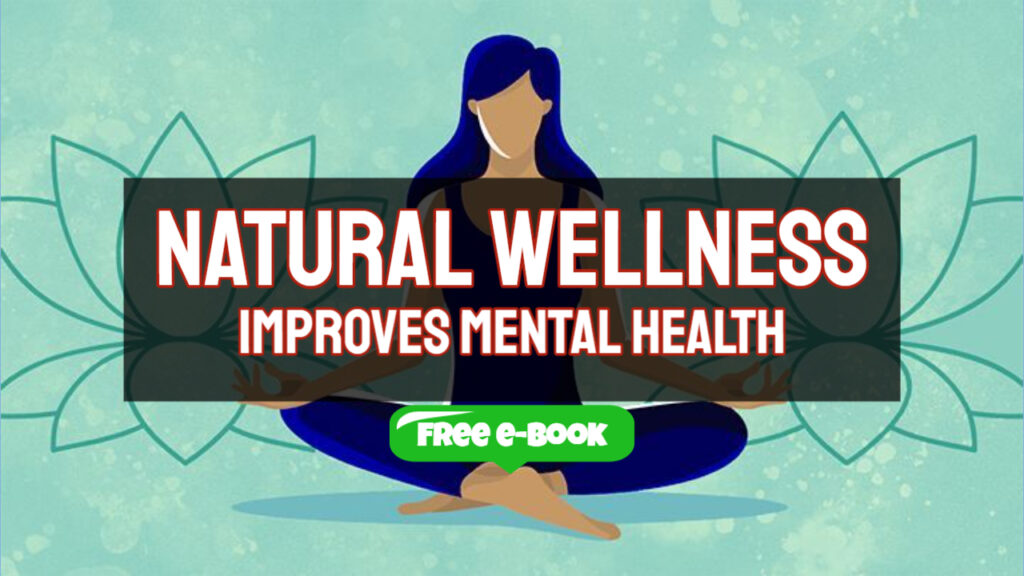Tips To Improve Your Mental Health Living A Natural Lifestyle
Living a natural lifestyle offers several advantages, some of which have been recognized since before the advent of modern medicine. Some traditions, in fact, have been utilized as effective cures for millennia. If you want to improve your mental health and wellness by taking a more natural approach, why not try one or all of these ideas?
Purchase a pet
It’s common knowledge that having a pet promotes mental health by alleviating symptoms of despair and anxiety.
Pets bring unconditional affection and companionship, which are both natural antidepressants. If you don’t want or can’t afford a pet, you can still benefit from caressing animals at an animal sanctuary or seeing cute videos online (1).
Spend time outside in nature.
Spending time outside in nature relieves stress and removes you from the distractions and worries of contemporary life.
Natural settings, such as parks, woods, and the beach, offer a sense of serenity and tranquility that may be extremely good for mental health (2).
Go off-the-grid.
While we’re talking about spending time in nature, why not combine that with a 24-hour period without using technology? Anxiety and depression have been linked to social media (3). When you spend more time on digital media than with actual people, you may experience feelings of loneliness. Furthermore, social networking sites like Facebook and Twitter can generate anxiety by allowing users to compare themselves to others online. Leave your phone at home, close your laptop, and turn off the TV. Instead of worrying about notifications, emails, and tweets, do something enjoyable.
Participate in an outdoor activity.
Studies suggest that when individuals join together for frequent outdoor activities like hiking and cycling, their anxiety and sadness levels drop.
It has been proposed that the beneficial influence of nature on mental health may be due to greater levels of mindfulness, less stress, and enhanced self-esteem (4).
Get some physical activity.
Endorphins, which make us feel good and increase our mood, are released during exercise. According to research, those who engage in physical activity have lower levels of anxiety and depression than those who remain sedentary. In fact, physical inactivity is thought to be a separate risk factor for mental health issues such as anxiety and depression (4).
Start doing yoga.
Yoga is beneficial to one’s mental wellness.
It can aid in the reduction of anxiety, sadness, and stress. Yoga also promotes heart health, making it beneficial to the entire body. This excellent kind of exercise will help you relax and feel better (5).
Choose natural therapies.
For millennia, various plants have been utilized as medicines.
Lavender, lemon balm, and chamomile, for example, have been used for generations as natural treatments to treat insomnia, induce relaxation, and alleviate anxiety and sadness.
St. John’s Wort is well recognized as an effective therapy for moderate depression and is available as a supplement (6).
Consider getting a massage.
 Massage therapy has been shown in studies to reduce sadness and anxiety in persons who receive it on a regular basis.
Massage therapy has been shown in studies to reduce sadness and anxiety in persons who receive it on a regular basis.
Massage therapy is frequently used as a method of treatment for individuals suffering from mental illnesses. This is due to the fact that it reduces the pulse rate, allows you to relax, and releases endorphins. There are several forms of massage, and some of them can help to relieve the pain of unpleasant ailments. When we have less pain, we feel less anxious and our mental health improves (7).
Aromatherapy oils used in massage can assist to relieve tension and promote relaxation even further.
If a massage is not available, consider burning a scented candle or soaking in a bath with essential oils. Lavender, sandalwood, and vanilla are excellent choices for relaxation (8).
Make time to unwind.
The pressures of contemporary life can easily overwhelm us.
Regardless, it is critical to prioritize sleep and relaxing time.
Deep breathing and guided visualization are two relaxation strategies that might assist to reduce tension and anxiety (9). Taking a nice bath every now and then may also be a terrific stress reliever. Place a Do Not Disturb sign on the door, fill the bubble bath, and either read or meditate as the warm water relieves your worries.
Go Zen.
Meditation has long been used to reduce stress and improve mental health.
It entails attention to the present moment, which is known as mindfulness. Meditation has been shown in studies to alleviate anxiety, despair, and even pain (9).
Get your Z’s
According to studies, those who receive their recommended amount of sleep (8 hours each night) have less anxiety and sadness than those who do not.
Unfortunately, insomnia is fairly prevalent among the elderly and, if left untreated, can lead to major health concerns.
If you have trouble sleeping, try yoga before going to bed to relieve anxiousness (10).
Get some rays
Vitamin D, which the body produces naturally when exposed to sunshine, can help ease depressive symptoms.
This implies that going outside and exposing your skin to direct sunshine for at least 15 minutes each day can assist maintain your mental wellness (11).
Eating a nutritious diet
Organic, unprocessed, and nutrient-dense foods are often the greatest foods to eat for optimal health.
Fresh fruits and vegetables, line-caught fish, and free-range meat, poultry, and eggs are all part of it. Reduce your intake of salt, sugar, and processed meals while increasing your intake of wholegrain carbs such as seeded bread, brown rice, and pasta. According to research, those who eat this manner are less likely to suffer from anxiety or sadness (12).
Consume nutritious carbohydrates.
Because your brain needs glucose to operate correctly, it is critical to maintain healthy blood sugar levels.
High GI carbohydrates (such as white bread, cakes, and cookies) induce big jumps in blood sugar, whereas low GI meals (such as beans, lentils, and whole grains) cause a more steady rise.
Foods with a high GI should be consumed in moderation since they have been associated with sadness and anxiety (12).
Consume omega-3 fatty acids.
Foods high in omega-3 fatty acids include fish, almonds, and flaxseed.
They are potent anti-inflammatories that alleviate the symptoms of depression, ADHD, bipolar disorder, and other mental illnesses.
Increasing your intake of these foods is an easy method to naturally boost your mental health (13).
Healthy fats for brain health
Because the brain is made up of more than 60% fat, you must consume a variety of healthy fats to maintain your brain healthy.
Monounsaturated and polyunsaturated fats found in avocados, olive oil, and salmon have a protective impact on the brain and can assist to avoid cognitive loss as we age (14).
Consume your greens.
Folate, which is required for DNA creation and repair, is found in leafy green vegetables (15).
This implies that eating your greens can help you avoid anxiety and despair (16).
Furthermore, dark green vegetables are abundant in vitamin B6, which is required for the creation of serotonin, a neurotransmitter that aids in mood improvement (17).
Improve your gut health.
The gut-brain link is gaining traction among mental health specialists.
In fact, the stomach produces up to 90% of serotonin, the feel-good hormone. Many mental health disorders are considered to be connected to bacterial imbalances. These “friendly” microorganisms have been demonstrated to boost mood (18). They also aid in the healthy functioning of the intestines, as well as the improvement of immunity and the reduction of inflammation (19).
Consume prebiotics.
Prebiotics are fibers that are not digested and are present in fibrous plants. Prebiotics nourish the gut’s ‘friendly’ bacteria (probiotics) (19). They create the hormones and enzymes we require to feel happy when they have enough to consume. Furthermore, having a lot of prebiotics to eat allows them to develop and reproduce. The more beneficial bacteria we have in our stomachs, the better we feel.
Music can help you unwind.
Listening to music is a simple technique to alleviate tension and anxiety.
Listen to soothing music before going to bed to help you relax and boost your mental health.
Music has also been proved to reduce blood pressure, so including it in your relaxation practice can help your heart health (20)
Discover how to play an instrument.
Learning to play an instrument can aid in brain function improvement.
Playing a musical instrument, in fact, has been demonstrated to improve memory, verbal fluency, and problem-solving abilities. It raises confidence, boosts self-esteem, and allows you to express your feelings — whether pleased, sad, or furious. It is also a terrific opportunity to meet new people and may provide a sense of accomplishment that benefits mental health (21).
Continue to dance
Dancing is an excellent approach to relieve stress and enhance mental wellness. It’s also a terrific method to work out if going to the gym isn’t your thing. Dancing has been demonstrated to be just as helpful as medicine in treating depression. Take a lesson or simply put on some music and “dance like no one is looking” (22)!
Book reading
Reading fiction has been found in studies to increase empathy and social-emotional intelligence (23).
Reading can improve memory, improve brain function (24), and even lower the chance of dementia (25). Reading is a terrific way to escape from the stresses of the day by immersing yourself in a fantasy world for a few hours.
Keep a thankfulness notebook.
According to studies, persons who write down three things they are grateful for each day to have a considerable improvement in their mental health and well-being.
Writing about stressful circumstances has also been associated with increased immune function and lower blood pressure. Getting things out of your thoughts and into paper can sometimes help to alleviate anxiety. Another method journaling may improve your self-esteem, confidence, and attitude is to write down three things you accomplished each day (26).
- How can a pet help my mental health? https://www.mentalhealth.org.uk/a-to-z/p/pets-and-mental-health
- How Does Nature Impact Our Wellbeing? https://www.takingcharge.csh.umn.edu/how-does-nature-impact-our-wellbeing
- Social media use and anxiety in emerging adults https://www.sciencedirect.com/science/article/abs/pii/S0165032716309442
- The Relationship between the Physical Activity Environment, Nature Relatedness, Anxiety, and the Psychological Well-being Benefits of Regular Exercisers https://www.frontiersin.org/articles/10.3389/fpsyg.2017.01058/full
- A randomised comparative trial of yoga and relaxation to reduce stress and anxiety https://bit.ly/3quclic
- What is St John’s wort? https://www.mind.org.uk/information-support/drugs-and-treatments/st-johns-wort/about-st-johns-wort/
- Massage: Get in touch with its many benefits https://www.mayoclinic.org/healthy-lifestyle/stress-management/in-depth/massage/art-20045743
- What Is Aromatherapy? https://www.webmd.com/balance/stress-management/aromatherapy-overview
- Six relaxation techniques to reduce stress https://www.health.harvard.edu/mind-and-mood/six-relaxation-techniques-to-reduce-stress
- The effects of improving sleep on mental health (OASIS): a randomized controlled trial with mediation analysis https://www.sciencedirect.com/science/article/pii/S2215036617303280
- Efficacy of vitamin D supplementation in major depression: A meta-analysis of randomized controlled trials https://www.jpgmonline.com/article.asp?issn=0022-3859;year=2019;volume=65;issue=2;spage=74;epage=80;aulast=Vellekkatt
- Is Your Mood Disorder a Symptom of Unstable Blood Sugar? https://sph.umich.edu/pursuit/2019posts/mood-blood-sugar-kujawski.html
- The health benefits of omega-3 polyunsaturated fatty acids: a review of the evidence http://www.nutrasource.ca/files/rev%20-%202004%20-%20j%20hum%20nutr%20diet%20-%20n3fa%20health%20benefits.pdf
- Diet-Derived Fatty Acids, Brain Inflammation, and Mental Health https://www.ncbi.nlm.nih.gov/pmc/articles/PMC6448040/
- The Biological Chemistry of Folate Receptors http://citeseerx.ist.psu.edu/viewdoc/download?doi=10.1.1.322.4551&rep=rep1&type=pdf
- Nutrition and Depression: The role of Folate https://addictiondomain.com/wp-content/uploads/2018/09/Nutrition_and_depression_The_.pdf
- Homocysteine, folate, methylation, and monoamine metabolism in depression https://jnnp.bmj.com/content/69/2/228
- Gut-Microbiota and Mental Health: Current and Future Perspectives https://www.researchgate.net/profile/Dr-Ajit-Thakur/publication/260425062_Gut-microbiota_and_mental_health_Current_and_future_perspectives/links/00b7d53134a2bcb221000000/Gut-microbiota-and-mental-health-Current-and-future-perspectives.pdf
- Probiotics, Prebiotics, and Synbiotics https://link.springer.com/chapter/10.1007/10_2008_097
- Mental Health Implications of Music: Insight from Neuroscientific and Clinical Studies https://www.tandfonline.com/doi/abs/10.3109/10673229.2011.549769
- 5 ways learning an instrument can improve your mental health https://sloanschoolofmusic.com/improving-mental-health-musical-instruments/
- Mental Benefits of Dance https://www.webmd.com/mental-health/mental-benefits-of-dance
- Fiction: Simulation of Social Worlds https://www.cell.com/trends/cognitive-sciences/fulltext/S1364-6613(16)30070-5
- Short- and Long-Term Effects of a Novel on Connectivity in the Brain https://www.liebertpub.com/doi/full/10.1089/brain.2013.0166
- Life-span cognitive activity, neuropathologic burden, and cognitive aging https://www.ncbi.nlm.nih.gov/pmc/articles/PMC3772831/
- The Neuroscience of Gratitude and How It Affects Anxiety & Grief https://positivepsychology.com/neuroscience-of-gratitude/
The post Tips for Using Natural Living to Improve Your Mental Health appeared first on https://gqcentral.co.uk




Comments are closed